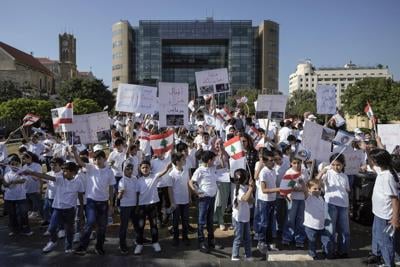
Lebanon’s Hezbollah launched a massive barrage of rockets into northern Israel on Wednesday in retaliation for the killing of a top commander, escalating tensions in the region as cease-fire talks for Gaza remain uncertain.
The attack by Hezbollah, an Iran-backed ally of Hamas, occurred while U.S. Secretary of State Antony Blinken was in the region advocating for a cease-fire proposal that has garnered international support but has not been fully embraced by Israel or Hamas. Hezbollah’s response to the proposal included requests for amendments, indicating a complex diplomatic landscape.
Since the start of the Israel-Hamas war eight months ago, Hezbollah has engaged in near-daily exchanges of fire with Israel, linking its actions to the need for a truce in Gaza. This ongoing conflict has raised concerns about a broader regional escalation.
The recent rocket barrage from southern Lebanon, about 160 projectiles according to the Israeli military, marked one of the largest attacks since the conflict began. While there were no immediate reports of casualties, the attack triggered air raid sirens and ignited brush fires.
Hezbollah stated that it targeted two military bases in response to the killing of its senior commander, Taleb Sami Abdullah, also known as Hajj Abu Taleb. The Israeli strike that led to Abdullah’s death occurred late Tuesday, approximately 10 kilometers from the border.
The broader context of the conflict involves other Iranian-backed groups, such as militias in Iraq and Syria, and Houthi rebels in Yemen, which have also targeted Israeli and U.S. interests, often resulting in retaliatory measures.
U.S. President Joe Biden’s administration has expressed support for a phased cease-fire proposal that includes Israeli withdrawal from Gaza. However, conflicting signals from Israeli Prime Minister Benjamin Netanyahu about the proposal’s acceptance add uncertainty to the situation.
Hamas has signaled conditional support for the proposal, highlighting concerns about Israeli compliance with its terms, especially regarding a permanent end to hostilities and Gaza’s reconstruction.
As diplomatic efforts continue, with Blinken’s visit to Qatar for further negotiations, the region remains on edge with fears of escalating violence and humanitarian crises in Gaza, where thousands have been killed or displaced during the conflict.
The proposed plan, if accepted and implemented, aims to bring about a phased cease-fire, release of hostages, humanitarian aid distribution, and long-term reconstruction efforts in Gaza. However, challenges persist amid political complexities and differing interpretations of the proposed terms.
Sources By Agencies


